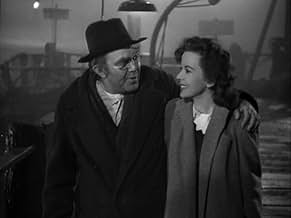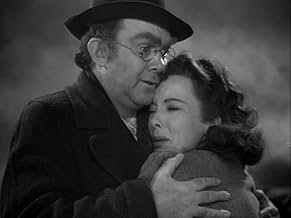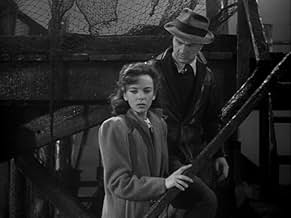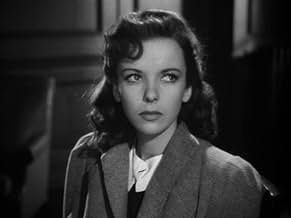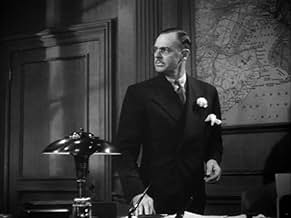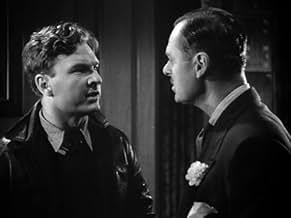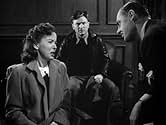Un mafioso del muelle de Brooklyn intimida a los propietarios de barcos para que paguen dinero para protegerse, pero dos pescadores hartos deciden eliminar al gángster ellos mismos en lugar ... Leer todoUn mafioso del muelle de Brooklyn intimida a los propietarios de barcos para que paguen dinero para protegerse, pero dos pescadores hartos deciden eliminar al gángster ellos mismos en lugar de quejarse ante la policía.Un mafioso del muelle de Brooklyn intimida a los propietarios de barcos para que paguen dinero para protegerse, pero dos pescadores hartos deciden eliminar al gángster ellos mismos en lugar de quejarse ante la policía.
- Dirección
- Guionistas
- Elenco
- Drug Store Soda Jerk
- (sin créditos)
- Newsboy
- (sin créditos)
- Card Game Kibitzer
- (sin créditos)
- Man Reporting Fire to Magruder
- (sin créditos)
- Joe
- (sin créditos)
Opiniones destacadas
What must have annoyed Garfield no end was the ethnic cleansing of the story, the uprooting of all the Jewishness from the original play to the film. Out Of The Fog was originally entitled The Gentle People which was written by Irwin Shaw and ran for 141 performances on Broadway in 1939. If Garfield had not been in Hollywood in 1939 he could easily have been in the lead on Broadway.
On Broadway the part was played by Franchot Tone. Garfield fits the role perfectly, but I certainly would love to have seen what Tone did with the part. The Gentle People was hardly the kind of property that his studio MGM would have bought. Over at Leo the Lion Franchot Tone was rarely out of his dinner clothes, it was later when freelanced that he showed he was capable of this kind of role on screen.
The parts played by the two older men who are among several of Garfield's 'clients' are John Qualen and Thomas Mitchell. On Broadway they had distinctly Jewish last names and were played by Lee J. Cobb and Sam Jaffe. Garfield approaches these two men who are partners in a fishing boat and offers them 'protection' for $5.00 a week, a special rate because he's liking Mitchell's daughter Ida Lupino.
Shaw's play is of course an anti-Nazi allegory, but Warner Brothers decided to take the ethnicity away from the victims. Still the message is comes through loud and clear as Qualen and Mitchell decide that when the law doesn't work, they have to take matters in their own hands.
As always the mark of a good play or film is the development of lesser characters like Aline McMahon who is the longstanding perpetually suffering mother with continual aches and pains. Also Eddie Albert who plays Ida's steady reliable beau who looks rather plain next to Garfield's flash.
Robert Homans as the Irish cop on the beat who delivers a final summation for the results of the story has some words to the wise. There are times when conventional law enforcement won't do the job.
Highly recommended.
This drama was interesting, had a rich atmosphere and a good cast. That, however, doesn't mean I enjoyed it. Garfield was so mean he was disgusting, John Qualen was so lily-livered I wanted to slap him, and all I could do was pity poor Thomas Mitchell. How Lupino could have had anything to do with Garfield after she found out he was demanding money from her father is beyond me.
The point of the film, brought home by Eddie Albert and Mitchell, is that Stella is just an ordinary girl and she shouldn't want or reach for anything special. Well, maybe she shouldn't have wanted or reached for any special via John Garfield, but how's that for a nice sexist 1940s message. However, the ending (not liked by at least one of the posters commenting here) does indicate that Stella will be able to achieve a balance in her life, so in that way, it was very satisfying.
The best characters were played by Mitchell and Qualen who, not surprisingly, give the best performances. They had a lot more to work with, Mitchell especially, and he gave it everything he had. Garfield's role was one-dimensional, and we learn nothing about how he came to be such a rat, so all you can do is hate him. Lupino's role is strictly ingénue - she found a better niche later on.
Interesting movie that, whether you like it or not, will hold your interest.
As for the characters themselves, they are largely one-dimensional, and unconvincingly unworldly for big-city people of the late 1930s. I found the Ida Lupino character hardly credible in her inability to resist the lure of small-time thrills promised by a fling with Goff: she does in fact resist him initially, she is gently warned about his likes by her father, with whom she has an excellent relationship, and despite her yearning for something more than what she has, Goff is no different from scores like him that she would have seen come and go over the years.
Lupino and Garfield are cast as "types," resulting in neither having an opportunity to utilize their considerable talents. Eddie Albert, as he so often does, plays an ineffectual nice guy. Aline McMahon is a complaining wife, a role that seems to have no particular function in the story. The honors do indeed go to Thomas Mitchell and John Quaylen, who make the most of characters given an opportunity to weigh things in the balance, change their minds, and act according to their principles. Even so, the "comical" closing scene is out of keeping with the overall mood of the picture.
¿Sabías que…?
- TriviaHumphrey Bogart was originally chosen to play Harold Goff. However, Ida Lupino had just finished shooting La pasión manda (1940) and Su último refugio (1941) with Bogart, and they had not gotten along. Lupino protested, and because she was a bigger name than Bogart at the time, she got her way. An angry Bogart shot off a telegram to Jack L. Warner asking, "When did Ida Lupino start casting films at your studio?"
- Errores(at around 18 mins) Stella is talking to Goff, but not looking at him, and says "You must be a very successful man; you've got a successful attitude." There's an immediate cut to Goff responding, and Stella is is looking directly at his face.
- Citas
Olaf Johnson: She's 37 today. She wants me to go to her birthday party - her 37th birthday... so she says.
Jonah Goodwin: 37! She's fifteen minutes younger than the Roman Empire.
- Versiones alternativasThe available version on VHS in Argentina was lifted from a 16mm print in English with Spanish language subtitles. The credits were also redone in Spanish.
- ConexionesFeatured in The John Garfield Story (2003)
- Bandas sonorasConcert in the Park
(uncredited)
Written by Cliff Friend and Dave Franklin
[Played in the bar at the beginning; also played when Jonah and Olaf discuss moving the boat to Gravesend Bay and at the end]
Selecciones populares
- How long is Out of the Fog?Con tecnología de Alexa
Detalles
- Fecha de lanzamiento
- País de origen
- Idioma
- También se conoce como
- Out of the Fog
- Locaciones de filmación
- Productoras
- Ver más créditos de la compañía en IMDbPro
- Tiempo de ejecución1 hora 25 minutos
- Color
- Relación de aspecto
- 1.37 : 1
Contribuir a esta página



